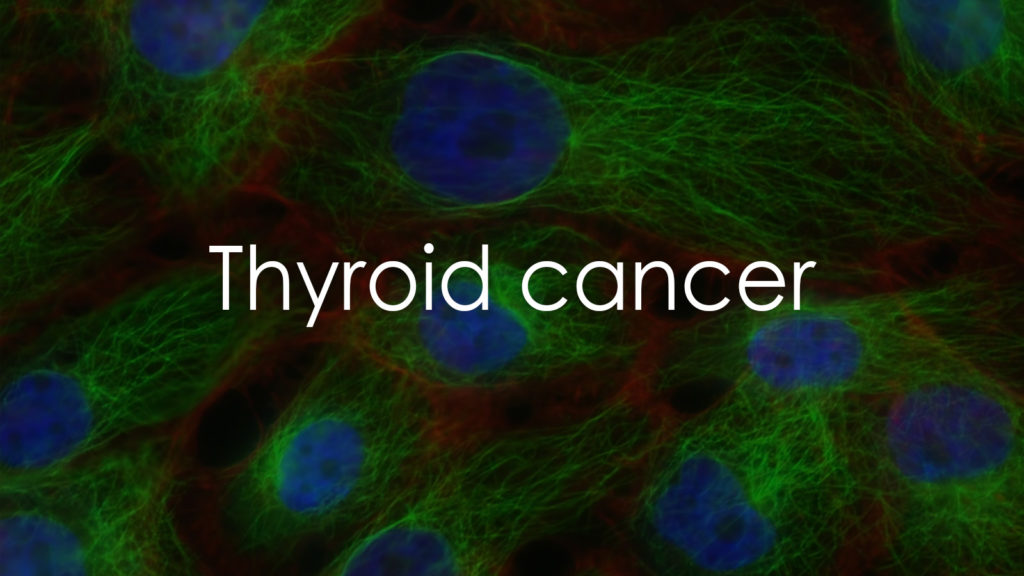Thyroid cancer is a type of cancer that develops in the thyroid gland, a small, butterfly-shaped gland located at the base of the neck. While thyroid cancer often presents with subtle symptoms, early detection is crucial for effective treatment. This article explores the various symptoms associated with thyroid cancer, helping readers recognize potential warning signs and seek timely medical attention.

Early Symptoms of Thyroid Cancer
In the early stages, thyroid cancer may not cause noticeable symptoms, making it challenging to detect without regular medical check-ups.
Lump or Nodule in the Neck
One of the most common early symptoms of thyroid cancer is the presence of a lump or nodule in the neck. This lump is often painless and can be felt just below the Adam’s apple. While many thyroid nodules are benign, any new or unusual lump in the neck should be evaluated by a healthcare provider.
Swollen Lymph Nodes
Swollen lymph nodes in the neck, particularly when they persist without an obvious infection, can be an early sign of thyroid cancer. Lymph nodes may feel firm or enlarged and are often located near the lump or nodule in the thyroid.
Changes in Voice
A hoarse or changing voice is another early symptom of thyroid cancer, especially if the cancer is affecting the nerves that control the vocal cords. This hoarseness may persist over time and is often accompanied by other symptoms such as difficulty speaking or changes in vocal pitch.
Localized Symptoms
As thyroid cancer progresses, it can cause localized symptoms that directly affect the neck and surrounding areas.
Difficulty Swallowing (Dysphagia)
Difficulty swallowing, also known as dysphagia, can occur when a thyroid tumor presses on the esophagus. Patients may experience a sensation of food getting stuck in the throat or have trouble swallowing solid foods. This symptom can become more pronounced as the tumor grows.
Difficulty Breathing (Dyspnea)
Thyroid cancer can also cause difficulty breathing, known as dyspnea, if the tumor grows large enough to press on the windpipe (trachea). Patients may experience shortness of breath, especially during physical activity or when lying down. In severe cases, the tumor can obstruct the airway, leading to significant breathing difficulties.
Persistent Cough
A persistent cough that is not related to a cold or respiratory infection can be a symptom of thyroid cancer. This cough is usually dry and may be accompanied by other symptoms such as hoarseness or difficulty breathing. A cough that persists for several weeks or worsens over time should be evaluated by a healthcare provider.
Systemic Symptoms
Systemic symptoms are those that affect the entire body and may indicate that the thyroid cancer is advancing or has spread to other areas.
Unexplained Weight Loss
Unexplained weight loss is a systemic symptom that can occur in thyroid cancer, particularly in more advanced stages. Patients may notice a significant decrease in weight without making any changes to their diet or exercise routine. This weight loss can be accompanied by fatigue and general weakness.
Fatigue and Weakness
Fatigue and weakness are common systemic symptoms of thyroid cancer. Patients may feel unusually tired, even after getting enough rest, and may find it difficult to carry out daily activities. This fatigue can be persistent and is often accompanied by other symptoms such as weight loss or changes in appetite.
Pain in the Neck or Throat
As thyroid cancer progresses, it can cause pain in the neck or throat. This pain may be localized to the area of the tumor or may radiate to the ears or jaw. The pain is often persistent and may worsen with swallowing or speaking.
Advanced Symptoms of Thyroid Cancer
In advanced stages, thyroid cancer may cause more severe symptoms that indicate the disease has spread to other parts of the body.
Bone Pain
If thyroid cancer spreads to the bones, it can cause significant bone pain. This pain is often deep and aching and may be felt in areas such as the back, hips, or legs. Bone pain may worsen at night or with movement and can be a sign that the cancer has metastasized.
Shortness of Breath
Shortness of breath, or dyspnea, can also occur if thyroid cancer spreads to the lungs. Patients may experience difficulty breathing, a persistent cough, or chest pain. This symptom is particularly concerning if it is accompanied by other signs of advanced cancer, such as weight loss or fatigue.
Difficulty Swallowing and Eating
As thyroid cancer advances, it can cause significant difficulty with swallowing and eating. This symptom is often due to the tumor pressing on the esophagus, making it difficult for food to pass through. Patients may experience choking, regurgitation, or a feeling of fullness after eating only small amounts.
Neurological Symptoms
In rare cases, advanced thyroid cancer can spread to the brain or spinal cord, leading to neurological symptoms such as headaches, seizures, or changes in vision. These symptoms indicate that the cancer has metastasized to the central nervous system and requires immediate medical attention.
Conclusion
Thyroid cancer is a disease that often presents with subtle symptoms, making it difficult to detect in its early stages. However, recognizing the potential warning signs, such as a lump in the neck, changes in voice, or difficulty swallowing, is crucial for early diagnosis and treatment. Systemic symptoms like unexplained weight loss, fatigue, and bone pain may indicate more advanced stages of the disease. If you experience any of these symptoms, it is important to seek medical evaluation promptly. Early detection of thyroid cancer can significantly improve the chances of successful treatment and recovery.